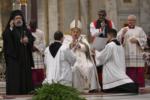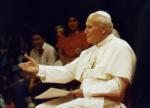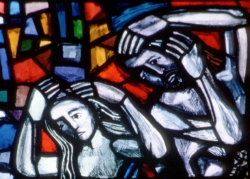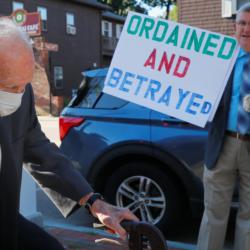The Origin of Original Sin
Poor St. Augustine. For quite a long time now, people have been blaming him for “inventing” the Catholic doctrine of original sin. He once wrote that, “the deliberate sin of the first man is the cause of original sin.” The fact is, though St. Augustine was perhaps the earliest example of a Catholic writer using the term “original sin,” he was hardly the first theologian to teach that doctrine. In fact, the Bible clearly refers to original sin in several places.
Before we examine the biblical evidence for original sin, let’s first make sure we understand what the Catholic Church means by the term. The Catechism [of the Catholic Church] explains:
“God created man in his image and established him in his friendship. A spiritual creature, man can live this friendship only in free submission to God. The prohibition against eating ‘of the tree of the knowledge of good and evil’ spells this out: ‘for in the day that you eat of it, you shall die.’ The ‘tree of the knowledge of good and evil’ symbolically evokes the insurmountable limits that man, being a creature, must freely recognize and respect with trust. Man is dependent on his Creator, and subject to the laws of creation and to the moral norms that govern the use of freedom.
“Man, tempted by the devil, let his trust in his Creator die in his heart and, abusing his freedom, disobeyed God’s command. This is what man’s first sin consisted of. All subsequent sin would be disobedience toward God and lack of trust in his goodness.
“In that sin man preferred himself to God and by that very act scorned him. He chose himself over and against God, against the requirements of his creaturely status and therefore against his own good. Constituted in a state of holiness, man was destined to be fully ‘divinized’ by God in glory. Seduced by the devil, he wanted to ‘be like God,’ but ‘without God, before God, and not in accordance with God.’
“Scripture portrays the tragic consequences of this first disobedience. Adam and Eve immediately lose the grace of original holiness. They become afraid of the God of whom they have conceived a distorted image -- that of a God jealous of his prerogatives.
“The harmony in which they had found themselves, thanks to original justice, is now destroyed: the control of the soul’s spiritual faculties over the body is shattered; the union of man and woman becomes subject to tensions, their relations henceforth marked by lust and domination. Harmony with creation is broken: visible creation has become alien and hostile to man Because of man, creation is now subject ‘to its bondage to decay.’ Finally, the consequence explicitly foretold for this disobedience will come true: man will ‘return to the ground,’ for out of it he was taken. Death makes its entrance into human history” (CCC 396-400).
The drama of Adam and Eve’s original sin -- the sin that had catastrophic consequences for all of us, their descendents -- begins in Genesis 2: 15-17 and continues in the third chapter of Genesis. It’s a tragic story we all know by heart, but it’s well worth your time to open your Bible and read this chapter slowly and prayerfully, seeing the parallel between their disastrous decision to defy God’s will and our own acts of defiance, called sin.
Their original sin set the stage for our own sin in that they lost for themselves and all of us those things that God had originally intended that all human beings should have as safeguards against sin: control over one’s passions, an enlightened intellect and, of course, grace.
Psalm 51:5 -- “Behold, I was brought forth in iniquity, and in sin did my mother conceive me.”
Wisdom 2:23-24 -- “God created man for incorruption, and made him in the image of his own eternity, but through the devil’s envy death entered the world, and those who belong to his party experience it.”
Wisdom 10:1-2 -- “Wisdom protected the first-formed father of the world, when he alone had been created; she delivered him from his transgression, and gave him strength to rule all things.”
Romans 5:12-14 -- “Therefore as sin came into the world through one man and death through sin, and so death spread to all men because all men sinned-- sin indeed was in the world before the law was given, but sin is not counted where there is no law. Yet death reigned from Adam to Moses, even over those whose sins were not like the transgression of Adam, who was a type of the one who was to come.”
1 Corinthians 15:21-22 -- “For as by a man came death, by a man has come also the resurrection of the dead. For as in Adam all die, so also in Christ shall all be made alive.”
These statements by St. Paul about Adam’s role in bringing “death through sin” into the world are echoes of what we read God saying to his people in Isaiah 43:27. “Your first father sinned, and your mediators transgressed against me.”
St. Augustine knew these biblical passages by heart, and he clearly understood that original sin was a reality that, however unpleasant it might be, must be acknowledged [and] dealt with by the saving gospel of Jesus Christ and the Sacrament of Baptism with which he endowed the Catholic Church. Far from “inventing” the teaching on original sin, as some mistakenly allege, the great bishop of Hippo reminded his readers of the above Scripture passages, as well as the various statements on original sin made by Church fathers in the centuries preceding him, the most eminent of all being the mighty St. Paul himself who taught: “sin came into the world through one man.” And that man was Adam.
Patrick Madrid is an author, public speaker, and the publisher of Envoy Magazine. Visit his website at www.surprisedbytruth.com
Additional passages: Job 14:1-6; Tobit 4:14; Sirach 10:15;
John 8:44; Ephesians 2:1-4; 1 Timothy 2:13-14
Related Sections in the Catechism: CCC 385-421



















